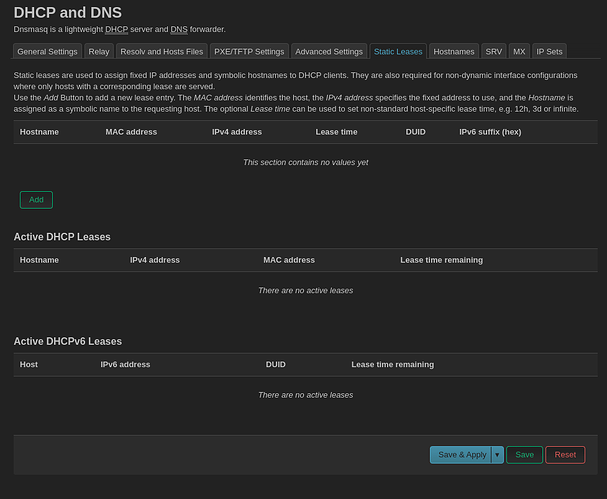This is a fresh install of openwrt, with zerotier module enabled.
OpenWrt 22.03.5, r20134-5f15225c1e
device is a TPLink Archer c7 v4
- all network clients are in dhcp mode
- openwrt is the only dhcp server on the network as evidenced by
tcpdumprevealing no other offers than from the openwrt router. cat /tmp/dhcp.leasesis emptycat /tmp/dhcpd.leasesis not empty
the Network > DHCP and DNS > Static Leases page reveals no entries:
How to fix, so that I can make this page show the correct information? is this a known bug?
cat /etc/banner
$ cat /etc/banner
_______ ________ __
| |.-----.-----.-----.| | | |.----.| |_
| - || _ | -__| || | | || _|| _|
|_______|| __|_____|__|__||________||__| |____|
|__| W I R E L E S S F R E E D O M
-----------------------------------------------------
OpenWrt 22.03.5, r20134-5f15225c1e
-----------------------------------------------------
cat /etc/openwrt_release
$ cat /etc/openwrt_release
DISTRIB_ID='OpenWrt'
DISTRIB_RELEASE='22.03.5'
DISTRIB_REVISION='r20134-5f15225c1e'
DISTRIB_TARGET='ath79/generic'
DISTRIB_ARCH='mips_24kc'
DISTRIB_DESCRIPTION='OpenWrt 22.03.5 r20134-5f15225c1e'
DISTRIB_TAINTS=''
cat /etc/device_info
$ cat /etc/device_info
DEVICE_MANUFACTURER='OpenWrt'
DEVICE_MANUFACTURER_URL='https://openwrt.org/'
DEVICE_PRODUCT='Generic'
DEVICE_REVISION='v0'
uci show dhcp
$ uci show dhcp
dhcp.@dnsmasq[0]=dnsmasq
dhcp.@dnsmasq[0].domainneeded='1'
dhcp.@dnsmasq[0].localise_queries='1'
dhcp.@dnsmasq[0].rebind_protection='1'
dhcp.@dnsmasq[0].rebind_localhost='1'
dhcp.@dnsmasq[0].local='/lan/'
dhcp.@dnsmasq[0].domain='lan'
dhcp.@dnsmasq[0].expandhosts='1'
dhcp.@dnsmasq[0].authoritative='1'
dhcp.@dnsmasq[0].readethers='1'
dhcp.@dnsmasq[0].resolvfile='/tmp/resolv.conf.d/resolv.conf.auto'
dhcp.@dnsmasq[0].localservice='1'
dhcp.@dnsmasq[0].ednspacket_max='1232'
dhcp.@dnsmasq[0].sequential_ip='1'
dhcp.@dnsmasq[0].leasefile='/tmp/dhcp.leases'
dhcp.lan=dhcp
dhcp.lan.interface='lan'
dhcp.lan.start='100'
dhcp.lan.limit='150'
dhcp.lan.leasetime='1h'
dhcp.lan.dhcpv4='server'
dhcp.lan.force='1'
dhcp.lan.dhcpv6='disabled'
dhcp.lan.ra='disabled'
dhcp.wan=dhcp
dhcp.wan.interface='wan'
dhcp.wan.ignore='1'
dhcp.odhcpd=odhcpd
dhcp.odhcpd.maindhcp='0'
dhcp.odhcpd.leasefile='/tmp/hosts/odhcpd'
dhcp.odhcpd.leasetrigger='/usr/sbin/odhcpd-update'
dhcp.odhcpd.loglevel='4'
dhcp.isc_dhcpd=isc_dhcpd
dhcp.isc_dhcpd.authoritative='1'
dhcp.isc_dhcpd.default_lease_time='3600'
dhcp.isc_dhcpd.max_lease_time='86400'
cat /etc/config/network
$ cat /etc/config/network
config interface 'loopback'
option device 'lo'
option proto 'static'
option ipaddr '127.0.0.1'
option netmask '255.0.0.0'
config globals 'globals'
option ula_prefix 'fdfc:0b78:d1f4::/48'
config device
option name 'br-lan'
option type 'bridge'
list ports 'eth0.1'
config interface 'lan'
option device 'br-lan'
option proto 'static'
option ipaddr '192.168.1.1'
option ip6assign '60'
option delegate '0'
option netmask '255.255.0.0'
config device
option name 'eth0.2'
option macaddr '50:c7:bf:de:20:5d'
config interface 'wan'
option device 'eth0.2'
option proto 'dhcp'
config interface 'wan6'
option device 'eth0.2'
option proto 'dhcpv6'
config switch
option name 'switch0'
option reset '1'
option enable_vlan '1'
config switch_vlan
option device 'switch0'
option vlan '1'
option ports '2 3 4 5 0t'
config switch_vlan
option device 'switch0'
option vlan '2'
option ports '1 0t'
cat /tmp/dhcpd.leases
$ cat /tmp/dhcpd.leases
lease 192.168.0.117 {
starts 6 2023/09/02 23:40:14;
ends 0 2023/09/03 00:40:14;
cltt 6 2023/09/02 23:40:14;
binding state active;
next binding state free;
rewind binding state free;
hardware ethernet 58:11:22:a2:fb:ce;
uid "\001X\021\"\242\373\316";
client-hostname "brass";
}
lease 192.168.0.119 {
starts 6 2023/09/02 23:40:15;
ends 0 2023/09/03 00:40:15;
cltt 6 2023/09/02 23:40:15;
binding state active;
next binding state free;
rewind binding state free;
hardware ethernet 9c:b6:d0:f0:29:c1;
uid "\001\234\266\320\360)\301";
client-hostname "pennyroyal";
}
lease 192.168.0.110 {
starts 6 2023/09/02 23:40:15;
ends 0 2023/09/03 00:40:15;
cltt 6 2023/09/02 23:40:15;
binding state active;
next binding state free;
rewind binding state free;
hardware ethernet b0:e4:d5:ba:83:7c;
uid "\001\260\344\325\272\203|";
set vendor-class-identifier = "android-dhcp-12";
}
lease 192.168.0.100 {
starts 6 2023/09/02 23:40:15;
ends 0 2023/09/03 00:40:15;
cltt 6 2023/09/02 23:40:15;
binding state active;
next binding state free;
rewind binding state free;
hardware ethernet 40:31:3c:64:27:cd;
client-hostname "chuangmi-ir-v2_miio108706619";
}
lease 192.168.0.101 {
starts 6 2023/09/02 23:40:16;
ends 0 2023/09/03 00:40:16;
cltt 6 2023/09/02 23:40:16;
binding state active;
next binding state free;
rewind binding state free;
hardware ethernet 7c:49:eb:b1:95:47;
client-hostname "lumi-gateway-v3_miio98936677";
}
lease 192.168.0.102 {
starts 6 2023/09/02 23:40:16;
ends 0 2023/09/03 00:40:16;
cltt 6 2023/09/02 23:40:16;
binding state active;
next binding state free;
rewind binding state free;
hardware ethernet 7c:49:eb:25:9a:8c;
client-hostname "chuangmi-plug-m1_miio88260889";
}
lease 192.168.0.103 {
starts 6 2023/09/02 23:40:16;
ends 0 2023/09/03 00:40:16;
cltt 6 2023/09/02 23:40:16;
binding state active;
next binding state free;
rewind binding state free;
hardware ethernet 7c:49:eb:22:c7:f9;
client-hostname "chuangmi-plug-m1_miio88075910";
}
lease 192.168.0.104 {
starts 6 2023/09/02 23:40:17;
ends 0 2023/09/03 00:40:17;
cltt 6 2023/09/02 23:40:17;
binding state active;
next binding state free;
rewind binding state free;
hardware ethernet 7c:49:eb:22:ea:f2;
client-hostname "chuangmi-plug-m1_miio88084863";
}
lease 192.168.0.105 {
starts 6 2023/09/02 23:40:18;
ends 0 2023/09/03 00:40:18;
cltt 6 2023/09/02 23:40:18;
binding state active;
next binding state free;
rewind binding state free;
hardware ethernet 9a:83:c4:06:de:d5;
set vendor-class-identifier = "udhcp 1.28.3";
}
lease 192.168.0.106 {
starts 6 2023/09/02 23:40:18;
ends 0 2023/09/03 00:40:18;
cltt 6 2023/09/02 23:40:18;
binding state active;
next binding state free;
rewind binding state free;
hardware ethernet 60:09:c3:b6:85:d5;
uid "\001`\011\303\266\205\325";
set vendor-class-identifier = "udhcp 1.22.1";
client-hostname "SolarInverter";
}
lease 192.168.0.107 {
starts 6 2023/09/02 23:40:20;
ends 0 2023/09/03 00:40:20;
cltt 6 2023/09/02 23:40:20;
binding state active;
next binding state free;
rewind binding state free;
hardware ethernet d4:f5:47:17:40:df;
client-hostname "Google-Nest-Mini";
}
lease 192.168.0.113 {
starts 6 2023/09/02 23:40:30;
ends 0 2023/09/03 00:40:30;
cltt 6 2023/09/02 23:40:30;
binding state active;
next binding state free;
rewind binding state free;
hardware ethernet 54:b8:0a:ef:e8:fb;
uid "\001T\270\012\357\350\373";
client-hostname "pennyroyal";
}
lease 192.168.0.112 {
starts 6 2023/09/02 23:40:34;
ends 0 2023/09/03 00:40:34;
cltt 6 2023/09/02 23:40:34;
binding state active;
next binding state free;
rewind binding state free;
hardware ethernet b8:27:eb:5d:a9:d8;
uid "\001\270'\353]\251\330";
client-hostname "homeassistant";
}
lease 192.168.0.108 {
starts 6 2023/09/02 23:41:49;
ends 0 2023/09/03 00:41:49;
cltt 6 2023/09/02 23:41:49;
binding state active;
next binding state free;
rewind binding state free;
hardware ethernet 2a:12:a4:33:8b:18;
uid "\001*\022\2443\213\030";
set vendor-class-identifier = "android-dhcp-12";
client-hostname "Zenobius";
}
